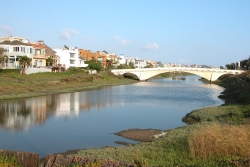A water pollution measure that could enhance the county’s ability to offset the costs of urban storm water runoff will soon be debated before the Board of Supervisors.
The Clean Water, Clean Beaches Measure is a regional response to the continuing problem of pollutants entering local and regional watersheds. County officials say it cost approximately $100 million to clean up the urban pollution last year.
“Storm water runoff is the number one source of coastal pollution in Los Angeles County,” Kirsten James, water quality director at Heal the Bay told the News.
The county proposal would charge parcel owners approximately $54 annually for storm water runoff cleanup. Owners of multiple parcels would pay a larger sum.
“The Clean Water, Clean Beaches measure seems like a reasonable way to address and deal with the pollution issue in our storm water,” said Sandrine Cassidy Schmitt, a Culver City resident and a board member of the Ballona Creek Renaissance.
“While we need to continue addressing the origins of these contaminated waters that pose such health and environmental risks, we also need to deal with it downstream through water control projects.”
County authorities are considering a special election in which only property owners would vote on the measure. If approved, the election would take place later this year and could be conducted by mail only.
Opponents of the measure say the notices that were sent to property owners over the last several weeks were not entirely clear as to what the county was proposing. “It was sent out during the holidays and to a lot of people it looked like junk mail,” said Fourth District Supervisor Don Knabe, whose district includes Marina del Rey. “We’re finding that a lot of people threw them away.”
Knabe opposes the proposed parcel tax and prefers a ballot referendum instead of the special election through the mail, in which case a majority would be necessary to approve the tax. If it is a ballot initiative, a two-thirds vote would be required before the measure becomes law.
The Long Beach School District is also opposing the measure.
Culver City Councilwoman Meghan Sahli-Wells thinks the measure illustrates the difference between short-range thinking and long-term planning. “In the short-term everyone will feel the impact but in the long run we’re all going to pay more if we don’t do something,” she said.
James said those who are concerned about the financial costs should view the property tax assessment from another vantage point. “I think they should think a little more broadly about the economic consequences of not passing this measure,” she countered. “Storm water runoff affects our local beaches and our local economy relies on tourism and our coasts are a big part of that.”
Knabe said voters should be aware that the tax is not temporary. “This is not a one-time hit….this is forever,” he cautioned.
“I have a front row seat to the pollution that runs directly to the ocean, every day, living across from the creek,” countered Cassidy Schmitt. “I definitely support a fee for this program as a straight forward way to fund this positive measure.
“We have to invest in healthy programs to continue living healthy lives. There are really no two ways about it.”
Like James, Cassidy Schmitt argues that a regional approach will be in the best interests of individual cities as well as countywide. She finds the notion of cities and county working together will increase the level of collaboration on these watershed issues and improve water quality very appealing.
“There is never enough protection in my point of view and any measure in this direction is a clear improvement,” she said.
James said revenue from the property tax assessment could be used for local water-saving programs as well as creating regional watershed authorities.
Knabe said his main concern at the hearing will be that everyone is aware of what they will be voting for and the benefits or consequences of that vote. “If everybody understands what it is they’re voting for and they still want it, then let them vote for it,” he said. “That’s the way democracy works.”
Sahli-Wells said this is an opportunity to improve water quality as well as save taxpayers money long term. “The status quo costs a lot more in the long run,” she reiterated. “The real question is how much is it going to cost us not to do this?”
The Board of Supervisors will hold a public hearing on Clean Water, Clean Beaches on Tuesday, Jan. 15 in downtown Los Angeles.
County officials say the parcel tax assessment will raise approximately $290 million.

